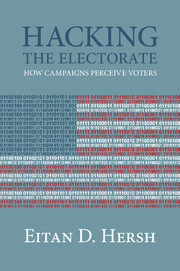Book contents
- Frontmatter
- Contents
- Acknowledgments
- 1 Introduction
- 2 The Perceived Voter Model
- 3 The Policy Roots of Elite Perceptions
- 4 Campaign Perceptions Quantified
- 5 The Perceived Partisan
- 6 The Public Code of Racialized Electioneering
- 7 Persuadable Voters in the Eyes of the Persuaders
- 8 Voters Perceived in Social Networks and Consumer Files
- 9 Conclusion
- Appendices
- Notes
- Bibliography
- Index
4 - Campaign Perceptions Quantified
Published online by Cambridge University Press: 05 July 2015
- Frontmatter
- Contents
- Acknowledgments
- 1 Introduction
- 2 The Perceived Voter Model
- 3 The Policy Roots of Elite Perceptions
- 4 Campaign Perceptions Quantified
- 5 The Perceived Partisan
- 6 The Public Code of Racialized Electioneering
- 7 Persuadable Voters in the Eyes of the Persuaders
- 8 Voters Perceived in Social Networks and Consumer Files
- 9 Conclusion
- Appendices
- Notes
- Bibliography
- Index
Summary
Since 2008, every major campaign in the country has had the ability to engage with voters based on an array of individual-level characteristics that are stored in national voter databases. These databases offer a glimpse at how campaigns perceive the dispositions of voters and act on those perceptions. My empirical investigation takes me behind the scenes to the data and perceptions of campaigns in order to examine how the policy environment affects campaign strategy.
This chapter introduces the primary sources of data that are the focus of the next four chapters. Among these sources are two of the most prominent and sophisticated data resources on the Democratic side of politics. The first is the national campaign database used by many Democratic and progressive campaigns that is put together by a company called Catalist. The second source is NGP VAN, a company that provides a user interface that allows campaign workers to interact with databases. With my colleague Ryan Enos, I fielded a survey of campaign workers who use NGP VAN, a project done in partnership with Obama for America and twenty-five state Democratic parties. This survey, as well as other data from NGP VAN and data from Catalist, will allow me to see voters in a new light: from the perspective of campaigns themselves.
VOTER DATA IN THE INFORMATION AGE
Because technology allowed for it, HAVA required it, and political campaigns demanded it, state election authorities made great strides between 2001 and 2008 in developing up-to-date, computerized, statewide voter registration files. Concurrently, private firms and political parties began building an infrastructure to connect this abundance of data to thousands of political campaigns across the country. Since election administrators were increasingly making available to political candidates a complete digital list of registered voters in their jurisdictions, one might wonder: Why did campaigns obtain data from intermediary vendors or political parties rather than retrieving a list directly from the election authority?
The reason campaigns use intermediary data suppliers is that registration lists can be augmented substantially to increase their usefulness.
- Type
- Chapter
- Information
- Hacking the ElectorateHow Campaigns Perceive Voters, pp. 66 - 87Publisher: Cambridge University PressPrint publication year: 2015



